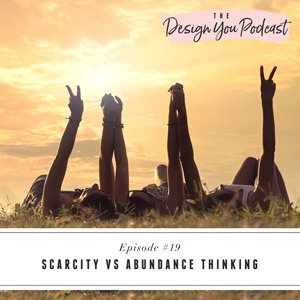
How often do you think that that thing you covet, that purse or food or client, won’t be available for you later if you don’t grab it right now? Do you often think things like, “I don’t have enough time,” “I can’t afford that,” or “I have to?” If these thoughts sound familiar, you might be operating from a scarcity mindset disguised as “being responsible.”
So what’s the big deal? Scarcity thoughts and the resulting actions or inactions come with huge costs. Living day-to-day in a scarcity mindset can keep you from making, having, and doing more in your zone of genius and having the beautiful, intentional life we talk about every week!
It’s time to upgrade your thoughts, friends. Scarcity thinking equals suffering. Abundance thinking equals more ease and more joy. Listen in today to hear how you can identify scarcity thoughts and what to do about them. You’ll also discover how to work on the flip-side of scarcity to abundance thinking, which can absolutely turn your life and business around.





